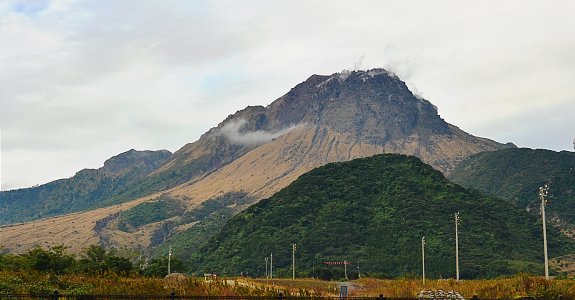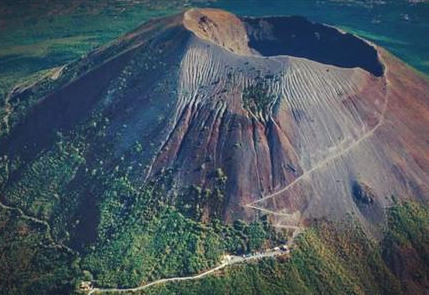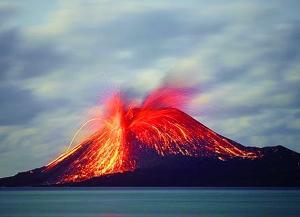(单词翻译:单击)
10.Mount Unzen: Japan: 1792: 15,000
10.云仙岳(所在地:日本,喷发时间:1792年,死亡人数:15000人)
Mount Unzen lies in a highly volcanic area which has seen eruptions occurring for the last 2 million years or so. The area around the mountain has formed into no less than four domes over the lifespan, and saw its worst (from a death-toll point of view) eruption striking in 1792. The volcano was actually initiated by an earthquake which started on the western flank of the mountain, slowly moving towards the active dome, known as Fugen-Dake. The seismic activity caused the volcano to erupt and the lava flowed for some two months. The earthquake continued to move westward and eventually caused the eastern flank of the mountain to collapse. The immense volume of earth moved in the landslide caused a tsunami when it hit the sea. Totting up the fatalities afterwards, it is estimated that some 5,000 people died in the landslide; another 5,000 were killed when the tsunami rushed AWAY from the area and the final 5,000 were taken when the wave 'bounced' back to its starting point.
云仙岳坐落于一处火山活动高度频繁的地带。在过去的两百多万年间,这里时不时就会发生火山喷发。云仙岳周遭在其活动期间已经形成了至少四个火山穹丘。1792年的那场喷发造成的伤亡最为严重。当时在火山西侧发生了一场地震,并逐渐波及到了名为普贤岳的活跃穹丘。该地震活动正是酿成此次火山喷发的罪魁祸首。岩浆不断从火山口喷涌而出,持续近两个月。余震继续向西移动,并最终导致火山东侧山体塌陷。大量的泥石伴随着山体滑坡涌入海中,形成了大海啸。根据事后的遇难人数统计,约有五千人死于山体滑坡,另有五千人在海啸离开当地的过程中丧生,还有五千人在海浪打回岸边时不幸遇难。

9.Mount Vesuvius: Italy: 79AD: 18,000
9.维苏威山(所在地:意大利,喷发时间:公元79年,死亡人数:18000人)

This is perhaps one of the best known of all historic volcanic eruptions: the towns of Pompeii and Herculaneum were completely covered and preserved by the ash cloud. Apart from the sad remains of men, women and children, not to mention loyal pets, we know a fair amount about the eruption as it was witnessed by Pliny the Younger, a Roman administrator and poet. The volcano gave reasonable warning of its intent to erupt with a series of ever more intense tremors occurring; sadly these were ignored by the general population as small earthquakes were considered to be just part of life in those days. The eruption of Vesuvius was intense and strong, lasting for two days and forming a relatively rare, but inescapable flow of super-heated gas and ash known as a pyroclastic flow. If Vesuvius were to erupt today the some 3 million people living in the shadow of the mountain would be in severe danger from the ash and lava, but also from the possibility of a large landslide and accompanying tsunami: a prospect that has seen the government beginning to encourage people to move away from the 'red' zone with cash incentives as well as putting into place a series of evacuation processes ready for the day when Vesuvius begins to rumble in earnest once more.
这或许是历史上最著名的一次火山喷发事故:庞贝和赫库兰尼姆大大小小的城镇被火山灰彻底掩埋,并由此保存了下来。除了那些令人心痛的男人、女人、孩子和皇室宠物的遗骸,我们还可以从亲历者小普林尼那里对此次火山喷发有所了解。小普林尼是一名罗马行政官,同时也是一位诗人。通过喷发前的一系列愈发强烈的轻微地震,火山向人们发出了严肃的警告,只可惜当时的人们并没有对此多加在意。对他们而言,这种小型地震不过是家常便饭。维苏威火山的喷发十分剧烈,持续两天。炽热气体和火山灰混合在一起,形成了一种被称为火山碎屑流的罕见灾害。人们无从逃脱。如果维苏威火山今天再次爆发的话,在山脚下居住的近三百万人将受到火山灰和岩浆的巨大威胁,还有可能要面临严重的山体滑坡和随之而来的海啸。正是因为预见到了这些,政府开始通过发放补贴来鼓励人们搬离这块危险区域,并落实了一系列疏散措施,唯恐哪天维苏威火山再一次向人们发出它那低沉的轰鸣。
8.Nevado Del Ruiz: Colombia: 1985: 23,000
8.内瓦多·德·鲁伊斯火山(所在地:哥伦比亚,喷发时间:1985年,死亡人数:23000人)

The Nevado Del Ruiz does not look like much of a threat to live and limb and yet this smallish snow-covered peak erupted explosively on November 13th in 1985, blasting some 30 kilometres into the air. Despite this show of might, the eruption was actually a relatively small one, but the heat of the lava and ash caused a lot of the nearby snow to melt, almost instantaneously, especially when the water of a nearby lake was included in the flow: the water was very salty, a factor which caused the snow to melt even faster. This sudden abundance of fluid on the flanks of the mountain could only go in one direction: down; and this it did with enthusiasm, forming four thick and fast-flowing lahars (rivers of ash, mud and volcanic debris that flow over the land, taking out everything in their paths). These four lahars flowed down the mountain and into the river valleys below, swelling the rivers to unrecognisable proportions and growing ever larger as they went. These massive bodies of water and mud travelled at around 60 kilometres per hour and, when they passed through towns and villages they simply took down all he houses and people that they encountered; being responsible for the deaths attributed to the volcano.
乍看之下,内瓦多·德·鲁伊斯火山似乎并不会对人们的生存造成威胁。然而,正是这座被雪覆盖的小山峰在1985年11月13日剧烈喷发,喷出物在空中高达约三十千米。尽管这一幕看起来威力十足,事实上这次喷发规模相对较小。然而,岩浆和火山灰所携带的巨大热量几乎在一瞬间融化了火山口周边的大量积雪,尤其是当附近的一片湖泊也加入到融雪形成的水流中之后:由于湖水中盐分很高,积雪会融化得更快。山坡上的流体在短时间内急剧增多,除了流向山下别无选择。奔腾的液流汇聚成了四条厚实湍急的火山灰泥流(在地面上流动的由火山灰、泥土和火山碎屑形成的河流,会摧毁沿途的一切障碍),沿着山坡冲向低处的河谷。河面随着火山灰泥流的涌入急遽上涨,一路上势头越来越猛。巨量的水体和泥土以约六十公里的时速奔涌,席卷了沿途所有的城镇和村落。房屋和居民被悉数吞没,导致此次火山喷发死者众多。
7.Mount Pelee: Martinique: 1902: 33,000
7.培雷火山(所在地:马提尼克岛,喷发时间:1902年,死亡人数:33000人)

Mount Pelee(Montagne Pelee in French, which translates to Bald Mountain) stands on the small island of Martinique, which is in the island arc of the Lesser Antilles in the Caribbean: an area known for frequent volcanic and seismic activity. The 1902 eruption seemed to take place fairly slowly, starting about a week before the main eruptions with tremors, and continuing for over two weeks until the main eruption occurred. With all that notice, one would be forgiven for assuming that everyone would have fled the area long before the main event, but this was not the case. Some people refused to leave their homes, farms, animals and possessions, while others left for a day or two, but returned again when little happened with the volcano. When the main eruption did happen (one eye-witness described the eruption thus: 'The mountain was blown to pieces, there was no warning.'), the people left in the main town of Saint-Pierre were killed by an extremely fast moving, and very hot, pyroclastic flow that streamed down the mountain in mere minutes.
培雷火山(法语名Montagne Pelee,意为秃头山)坐落在名为马提尼克的小岛上。马提尼克岛是加勒比海小安地列斯群岛的岛弧:这一带因其频繁的火山和地震活动而闻名。1902年发生的那场火山喷发事故节奏似乎比较缓慢。在大爆发到来约一周前,火山就开始有了轻微的震颤,直到大爆发结束两周后才真正停歇下来。你也许会想,这么明显的征兆,人们肯定都在大爆发前逃得远远的了。但事实并非如此。有些人拒绝撇下他们的房屋、农场、家畜和财产,其他人看到火山并没有什么大动作,离开一两天后便纷纷返回。据一位目击者描述,当大爆发真正来临时,“整座山被炸成了碎片,毫无预兆。”滚烫的火山碎屑流飞速扑向圣皮埃尔的主城区,留在那里的居民全都因此丧了命。这一切的发生只花了短短几分钟。
6.Krakatoa: Indonesia: 1883: 36,000
6.喀拉喀托火山(所在地:印度尼西亚,喷发时间:1883年,死亡人数:36000人)

Krakatoa signalled the beginning of its eruption in the years preceding the big eruption. In May 1883 the volcano seemed to display greater intent of erupting with ever-more intense tremors, small eruptions and huge plumes of gas. On the 27th of August the island erupted violently in a series of four explosions. So intense and violent was the eruption that the shockwave travelled all the way around the planet, not once or twice, but seven times and was heard as far away as Australia and the island of Rodrigues (near Mauritius): a distance of some 3,000 miles. The sheer violence of the eruption had knock-on consequences all over the world, causing floods and famines near and far. While the official and immediate death toll has been pegged at 36,000 experts say that as many as some 120,000 people may, in fact, have died as a result of the volcano.
喀拉喀托火山在大爆发几年前就向外界发出了信号。1883年5月,火山震颤变得越来越强烈,小规模的喷发和巨大烟尘柱的出现也变得愈发频繁,这似乎都是火山在展示自己愈发明确的喷发意图。8月27日,伴随着四声爆炸声,整座岛屿都开始猛地喷发起来。一切都是那样的猛烈,以至于形成的冲击波绕着地球转了不止一两圈,而是整整七圈,甚至远在三千英里之外的澳大利亚和罗德里格斯岛(近毛里求斯)都能听到爆炸声。剧烈的火山喷发在全世界范围内造成了一系列连锁反应,远近许多地方都发生了洪水和饥荒。虽然官方认定此次喷发的直接遇难者为36,000人,但专家们表示事实上总共约有120,000人死于喀拉喀托火山的喷发及其次生灾害。
翻译:李闻昱 校对:有耳陈小树 来源:前十网


